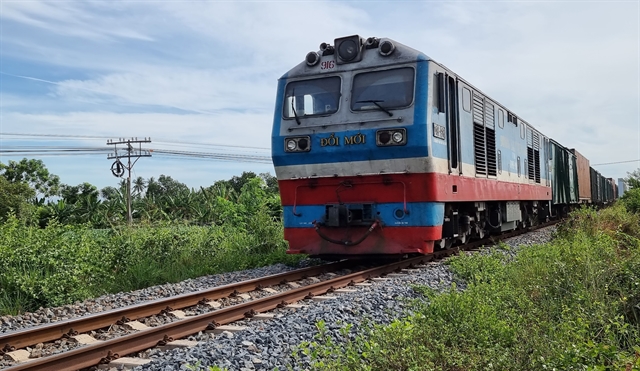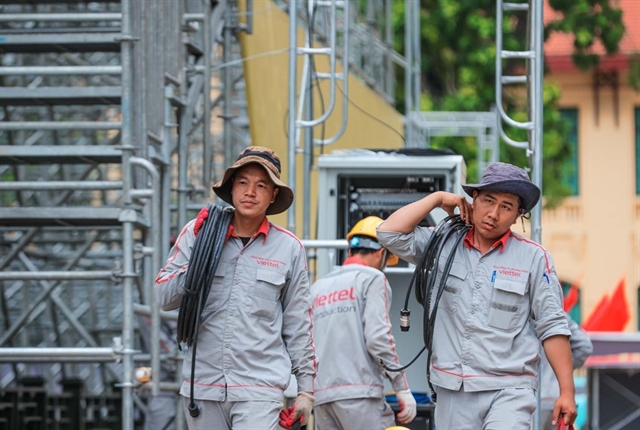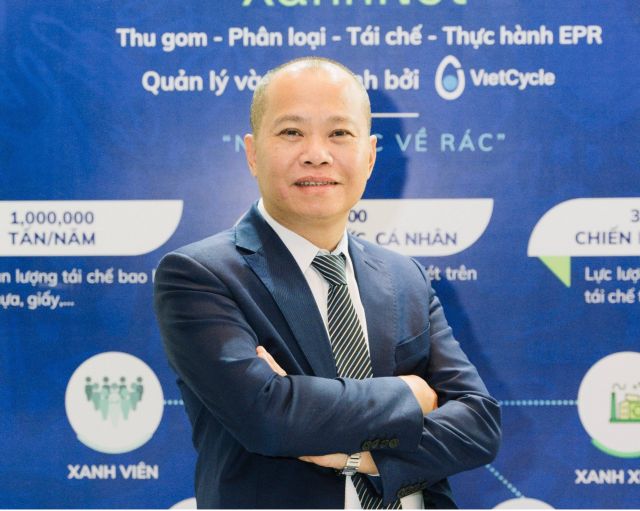 Economy
Economy

From January 1, 2024, Extended Producer Responsibility (EPR) regulations mandate producers and importers of lubricants, batteries, accumulators and types and various packaging types to either recycle or pay fees to bolster waste recycling efforts. Việt Nam News reporters spoke to leaders from DUYTAN Recycling Company, Tetra Pak Vietnam and VietCycle to explore the effects and opportunities stemming from this new mandate on their respective businesses and soeicty at large.
Sustainable solutions for waste management in Việt Nam
 |
| Lê Anh, Sustainability Director, DUYTAN Recycling Company. — Photo courtesy of the company |
Extended Producer Responsibility (EPR) holds businesses responsible for handling and recycling waste arising from the production process. Expected outcomes of this policy include increased recycling rates and the establishment of a circular economy model in Việt Nam.
However, to successfully implement EPR policy in Việt Nam requires joint efforts from the Government, businesses and the community. There is a need to streamline regulations and raise awareness about the benefits of eco-friendly products and environmental protection for both present and future generations. Through these efforts, we can contribute to promoting the circular economy, working towards environmental protection and sustainable development.
DUYTAN Recycling Company has been prepared for EPR for a considerable period of time. The company is greatly honoured to be listed among the top 24 units capable of recycling packaging products, as announced by the Ministry of Natural Resources and Environment on February 20, 2024, in Notice 86/TB-BTNMT. This signifies the company’s compliance with the recycling standards set by the ministry.
The main factor in successful waste recycling is investing in high technology that meets international standards. With synchronous and professional investment, DUYTAN Recycling Company always commits to product quality that meets international requirements and has full certifications such as EFSA, FDA. In 2023, we were honoured to receive the High-Tech Enterprise Certificate licensed by the Ministry of Science and Technology. We always operate for the goal of constantly investing in improving our recycling capacity, ensuring output and quality, meeting the demand for recycled plastic for domestic and foreign businesses.
Raising consumer awareness about waste classification at the source is an equally important factor. When consumers are knowledgeable about how to properly sort their waste into recyclables, organics and non-recyclables, it significantly reduces contamination and makes the recycling process more efficient. DUYTAN Recycling Company has co-operated in organising public awareness campaigns, educational programmes in schools and community workshops to promote responsible waste management habits. By providing consumers with knowledge and tools to classify waste correctly, we hope to increase recycling rates, contributing to reducing waste and protecting the environment in Việt Nam.
However, we are currently facing challenges in the process as most waste in Việt Nam is not well classified at the source. Collection and recycling activities are still small and spontaneous, mainly carried out manually in craft villages, and do not comply with environmental regulations. Meanwhile, packaging is still not standardised and not designed for recycling.
To enhance the management, recycling and reduction of plastic waste that pollutes the environment and oceans, we have invested and built a factory providing high quality recycled plastic products with "Bottle-to-Bottle” technology. Each used plastic bottle will be recycled into plastic pellets, creating a new cycle, thereby helping to reduce the use of fossil fuels.
We believe that the promotion of a circular economy in Việt Nam is a crucial objective in the company's long-term development strategy. As a result, we have actively engaged in forums and seminars on the circular economy with the aim of sharing the company's experiences and social initiatives with both domestic and international audiences. Through these sessions, DUYTAN Recycling Company aims to inspire and encourage more companies to join hands in the future to contribute to the establishment of a sustainable circular economy.
EPR implementation - key driver for Việt Nam recycling industry
 |
| Hoàng Đức Vượng, Chairman of VietCycle. — Photo courtesy of the company |
The Government's EPR policy is a groundbreaking measure in Việt Nam's environmental protection law. It is considered key for the development of the recycling industry and holds individuals and manufacturers accountable for proper disposal of packaging waste.
The policy provides financial support for technology transfer and upgrading recycling methods, ensuring environmental compliance. The enforcement of EPR will play a vital role in the country's recycling industry and the sustainable management of plastic waste.
Nevertheless, our recycling industry still faces many challenges.
The first challenge stems from its dependency on fluctuating oil prices in the market. The operational costs for recycling activities remain relatively fixed, but market fluctuations in oil prices impact operating expenses and ultimately affect the value of recycling operations.
Inadequate design regulations for recycling and the lack of hygiene and safety regulations for recycled products also hinder the growth of the industry. These issues require time, policy enhancement and consumer education to foster industry development.
To incentivise investment and development in the recycling industry, I have proposed "8 core policies" over the past four years to establish a circular economy for plastic waste. Building a closed-loop system for plastic waste requires the implementation of the EPR policy, which has been kicked off at the beginning of 2024.
Moreover, setting regulations that mandate the use of 20-30 per cent recycled plastic in all plastic products entering the market will further support the growth of recycling businesses.
In my opinion, to save resources and promote a circular economy, it is crucial to have recycling-oriented designs. We also need regulations on quality standards for plastic and recycled products in the country.
On the other hand, it is essential to develop markets for carbon credits and plastic credits. This will provide recyclers with the motivation to participate in credit trading and exchange, generating additional income to support activities such as collection, recycling, infrastructure upgrades and ensuring environmental safety and sanitation.
After years of working in the industry, I have found that major brands have shown a high level of compliance with the EPR policy, while smaller businesses still lack a deep understanding of the EPR policy and are waiting for official information and guidelines. Many businesses remain unaware of the specific details and implementation of the EPR policy.
As a result, it is crucial to conduct widespread awareness campaigns to ensure manufacturers, importers and businesses have a clear understanding ofand can effectively comply with the EPR policy. — VNS
Stakeholder collaboration is key factor for EPR execution
 |
| Lương Thanh Thư, Environment and Sustainability Manager, Tetra Pak Vietnam |
Effective waste management and Extended Producer Responsibility (EPR) legislation are crucial for boosting recycling rates. EPR laws have emerged as pivotal in governmental strategies for transitioning to a circular economy and addressing climate change.
All legislative measures should acknowledge that recycling packaging waste requires collaboration among governments, consumers and the private sector. National governments should codify roles and obligations in legislation, enforce regulations adequately, and monitor progress with traceable documentation. Meanwhile, local authorities should implement separate collection of packaging waste at its source and manage residual waste disposal safely. Consumers are encouraged to segregate waste at the household level, while producers of packaged goods and packaging manufacturers must ensure recycling solutions for their products and engage in consumer awareness campaigns to promote recycling.
In Việt Nam, the absence of an established classification system poses numerous challenges for businesses aiming to promote collection and recycling activities.
As a leading provider of packaging solutions, Tetra Pak has collaborated with Việt Nam’s F&B manufacturers for three decades and recognises the importance of collective efforts to assist clients in meeting their obligations under newly-regulated EPR guidelines. Through voluntary initiatives, Tetra Pak has actively engaged with collectors, recyclers, brand-owners and local governments to undertake two key interventions: raising public awareness about the recyclability of beverage cartons and encouraging consumer participation in sorting materials for recycling, while also enhancing the collection and recycling infrastructure for beverage cartons in Việt Nam.
Regarding the first intervention, collaborative efforts have led to the implementation of educational programmes reaching students at over 2,000 kindergartens and elementary schools across HCM City, Hà Nội and several other regions since 2019. Furthermore, we collaborate with partners to conduct awareness-raising initiatives for thousands of individuals residing in apartment complexes and shopping centres, including MM Mega Market and AEON MALL.
As for the second intervention group, we work closely with partners to establish and maintain a collection network for used beverage cartons within communities, facilitating easy access and participation for consumers in the collection programme.
Presently, our network comprises nearly 130 collection points nationwide, listed on our website at www.taichevohopgiay.com. Collected used beverage cartons are recycled into various products such as paper goods and roofing sheets by recycling facilities like Đồng Tiến and Thuận An in the South, and Vạn Điểm in the North. Recently, we invested over 1.2 million euros to upgrade the carton recycling line at Đồng Tiến, doubling the paper mill's recycling capacity from 9,000 to 17,000 tonnes per year, thereby enhancing carton recycling capabilities in Việt Nam. — VNS